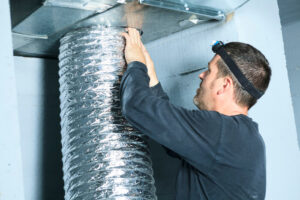If we were to ask you what HVAC stands for, you’d easily guess “heating and air conditioning.” But what about the “V” in HVAC? It stands for “ventilation,” and don’t be too hard on yourself if you didn’t know that. Not only do most homeowners not know what the “V” stands for, but many of them also aren’t aware of just how important your home’s ventilation system is.
You can invest in a high-efficiency furnace or air conditioner, but spending money on a costly system is only half the battle. Many other things affect your home’s energy efficiency, such as the quality of your ductwork and how well your home is insulated. Let’s go over these essential components of how to achieve the best energy efficiency levels in your home.
The Importance of Ductwork
When a heating system is trying to heat your home—or an AC system is trying to cool it down—and its support network is inferior ductwork, your HVAC system is going to have to work more to produce the same results. Even when it’s a high-efficiency system. It’s been estimated that as much as 30% of the conditioned air your system produces is lost to holes and cracks in ductwork.
Think about it this way. Imagine you’re dining out at a nice restaurant and the waiter sets the plate in front of you and then removes 30% of the food from the plate! But when the check comes, you’re paying 100% of the menu price. Anyone would be upset about having 1/3 of their meal taken away while paying full price!
When your home was first built, the ductwork was (hopefully) properly installed and in great condition when it was new. But just like everything, ductwork is subject to wear and tear over time. Connections can become misaligned and thin metal ductwork can develop holes and tears. Sometimes what seems like a furnace repair need—for example, weak airflow and high utility bills—is something caused by problematic ductwork.
To understand how we’ll help your home’s air ducts, we need to test them first. Air duct testing helps us identify problematic areas of your air ducts using high-tech equipment that measures pressure and airflow.
The Importance of Insulation
Your home’s insulation is another support network for your HVAC system. Insulation is a barrier against drafts, preventing the infiltration of hot and cold air, which in turn reduces the workload on HVAC systems.
Your home’s insulation was also likely in great condition when your home was first built. However, the quality of your home’s insulation can deteriorate over time and become less efficient. Insulation can “settle” or compact and shift which reduces its efficiency. Moisture intrusion can degrade insulation, causing it to lose its thermal resistance. A rodent infestation can also reduce the efficacy of insulation.
Do you want to make sure that your home’s ventilation isn’t the weak link undermining your home’s overall energy efficiency? Contact us today to learn more about how we can help!
At Hagerstown Heating & Cooling, we want to protect customers from Google and other contractors in Boonsboro, MD. Honesty at Its Best.

